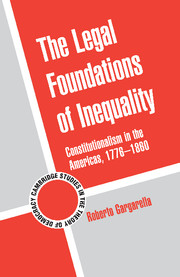2 - Conservatism: The Moral Cement of Society
Published online by Cambridge University Press: 06 July 2010
Summary
The Endless Influence of Conservatism
I define the conservative model of constitutionalism by two of its main features, political elitism and moral perfectionism. This conception, which played an important role in the U.S. constitutional debates, was enormously influential in Latin America during the nineteenth century. Its presence was particularly important after 1815, once the initial enthusiasm of the revolutionaries had disappeared. During the first few years after the revolution, many radicals thought it was possible to completely reconstruct the American communities, destroying with one stroke all the remnants of the past. This dream, however, proved to be impossible to achieve. Not surprisingly, with the first difficulties of the independence revolutions, conservatives became, once again, the leading political force in the continent and remained so during the following decades. At the end of the 1840s and the beginning of the 1850s, though, the conservative model was seriously challenged because of the growing importance of the democratic and revolutionary movements that originated in Europe and immediately spread over most of Latin America. During that period, conservatives lost part of their control: democracy was no longer the utopian dream of a few confused revolutionaries but a strong and widely supported social demand. Conservatives learned a lot from this experience, which forced them to find a way to adjust their political discourse, something they did, again, with renewed success.
Clearly, the combination of political authoritarianism and moral perfectionism that they promoted did not represent an ideological novelty.
- Type
- Chapter
- Information
- The Legal Foundations of InequalityConstitutionalism in the Americas, 1776–1860, pp. 90 - 152Publisher: Cambridge University PressPrint publication year: 2010

